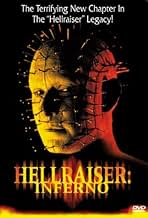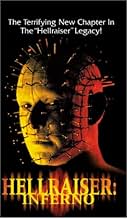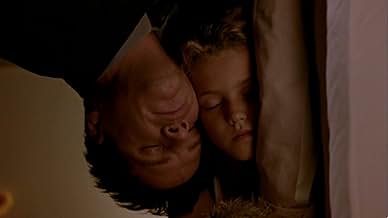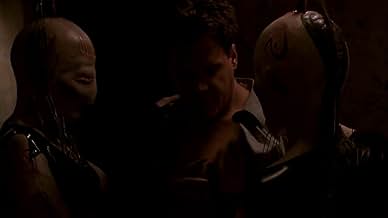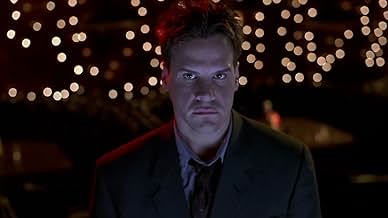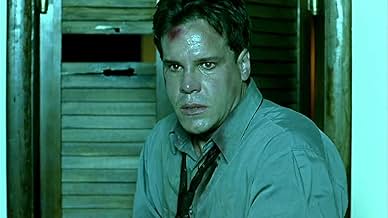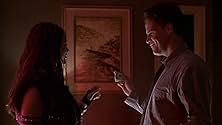PUNTUACIÓN EN IMDb
5,4/10
20 mil
TU PUNTUACIÓN
Añade un argumento en tu idiomaA shady police detective becomes embroiled in a strange world of murder, sadism and madness after being assigned a murder investigation against a madman known only as "The Engineer".A shady police detective becomes embroiled in a strange world of murder, sadism and madness after being assigned a murder investigation against a madman known only as "The Engineer".A shady police detective becomes embroiled in a strange world of murder, sadism and madness after being assigned a murder investigation against a madman known only as "The Engineer".
- Dirección
- Guión
- Reparto principal
- Premios
- 1 premio y 3 nominaciones en total
J.B. Gaynor
- Young Joseph
- (as JB Gaynor)
Reseñas destacadas
A shady police detective (Craig Sheffer) becomes embroiled in a strange world of murder, sadism and madness after being assigned a murder investigation against a madman known only as "The Engineer".
So, the story is that parts five through eight of Hellraiser were actually other films that had the script tweaked in order to make them part of the franchise, under the idea that more people would rent or buy the movie if it had Pinhead in it. Well, that last part is certainly true: many Hellraiser fans rented or bought this film and were gravely disappointed.
The problem is that this is actually a decent movie... except the Hellraiser parts. A corrupt cop tracking a serial killer, while going mad and being taunted by the killer? That always works. But why would Pinhead involve himself in this? It makes no sense with the character or the story as we know it. Remove the chains and Pinhead, and you have a good story that actually makes some level of sense.
So, now what about the franchise? Is it screwed? Do we ignore this and other films or do we just say it got worse as it went? Horror franchises going downhill is pretty standard, but by accepting this one into the mix, we are muddling the mythology. Why did they do this?
So, the story is that parts five through eight of Hellraiser were actually other films that had the script tweaked in order to make them part of the franchise, under the idea that more people would rent or buy the movie if it had Pinhead in it. Well, that last part is certainly true: many Hellraiser fans rented or bought this film and were gravely disappointed.
The problem is that this is actually a decent movie... except the Hellraiser parts. A corrupt cop tracking a serial killer, while going mad and being taunted by the killer? That always works. But why would Pinhead involve himself in this? It makes no sense with the character or the story as we know it. Remove the chains and Pinhead, and you have a good story that actually makes some level of sense.
So, now what about the franchise? Is it screwed? Do we ignore this and other films or do we just say it got worse as it went? Horror franchises going downhill is pretty standard, but by accepting this one into the mix, we are muddling the mythology. Why did they do this?
I must admit to expressing a certain level of cynasism when I selected Inferno from my local video store. While I had found the frist two installments of the Hellraiser Series to be both disturbing and visually breath taking I was in no way impressed with three and four and am usually very sceptical about any direct to video horror movies. In this case I had little need to be.
The production values throughout this film are far above it's direct to video peers. The lighting and set designs are of the same caliber as many theatrically released horror movies. I will admit that the production design doesn't compare to sureal atmosphere of Hellraiser 1 & 2, but the this film seems to be grounded in a more gritty realistic environment. Craig Sheffer gives an excellent performance as the film's flawed protagonist a corrupt cop. He gives a minimally emotional performance giving his vice riden character a hollow and feel reflecting his soul's depravity. Character actor Nicholas Turturro gives an excellent performances as Sheffer's partner. The special effects and gore are far above those of a B-Movie. I was especially impressed with the transformation of pinhead.
What really sets this sequel apart from it's preadecesors is the script. In an inspired move writer/director Scott Derrickson choose to vary his story drastically from 3 & 4 an focus on the seductive nature of evil and takes the form of a modern morality tale. It is essentially the story Sheffer's struggle to purify himself of his own corruption, and return to innocense. This is in many ways the movie The Bad Luetenant as interpreted through the horror genre. Yes, Pinhead and his demon companions on make short cameo appearances and this is bound to anger some fans. I must argue however that the dread of their presences is always felt in the films atmosphere, and their use in the "surprise" ending is very effective.
I do have some minors critasisms which prevent me from giving this film a ten rating. First of all the film as times does degrade to cliches from both horror films and police dramas. I also felt the use of the demons in cowboy hats performing martial arts border on being unbelievable. In order for a film to be entertaining the audience must be able to suspend disbelief moments like this are difficult to accept. Finally, there are several false ending to this film. While years ago this may have been seen as an inventive horror tactic in the eighties it has become static and predictable. In many ways it takes away from the viseral power of the films conclusion. I rate this film as an eight out of ten due to it's inventive interpretation of the Hellraiser Series, and I would recommend it to both fans and non-fans of the series.
The production values throughout this film are far above it's direct to video peers. The lighting and set designs are of the same caliber as many theatrically released horror movies. I will admit that the production design doesn't compare to sureal atmosphere of Hellraiser 1 & 2, but the this film seems to be grounded in a more gritty realistic environment. Craig Sheffer gives an excellent performance as the film's flawed protagonist a corrupt cop. He gives a minimally emotional performance giving his vice riden character a hollow and feel reflecting his soul's depravity. Character actor Nicholas Turturro gives an excellent performances as Sheffer's partner. The special effects and gore are far above those of a B-Movie. I was especially impressed with the transformation of pinhead.
What really sets this sequel apart from it's preadecesors is the script. In an inspired move writer/director Scott Derrickson choose to vary his story drastically from 3 & 4 an focus on the seductive nature of evil and takes the form of a modern morality tale. It is essentially the story Sheffer's struggle to purify himself of his own corruption, and return to innocense. This is in many ways the movie The Bad Luetenant as interpreted through the horror genre. Yes, Pinhead and his demon companions on make short cameo appearances and this is bound to anger some fans. I must argue however that the dread of their presences is always felt in the films atmosphere, and their use in the "surprise" ending is very effective.
I do have some minors critasisms which prevent me from giving this film a ten rating. First of all the film as times does degrade to cliches from both horror films and police dramas. I also felt the use of the demons in cowboy hats performing martial arts border on being unbelievable. In order for a film to be entertaining the audience must be able to suspend disbelief moments like this are difficult to accept. Finally, there are several false ending to this film. While years ago this may have been seen as an inventive horror tactic in the eighties it has become static and predictable. In many ways it takes away from the viseral power of the films conclusion. I rate this film as an eight out of ten due to it's inventive interpretation of the Hellraiser Series, and I would recommend it to both fans and non-fans of the series.
It's important to note that the writers decided to take the series in a new direction with Inferno. The problem is that the direction they chose is far enough removed from the heart and soul of Hellraiser - from the very things that made it great - to be nothing short of off-putting and disappointing. It's a near impossibility to view this film without doing so through the lens of the straight-to-video format in which it was released. This film takes a budgetary back seat to its four predecessors and it shows painfully. It's very evidently a film script that the studio couldn't otherwise sell and, seizing on the opportunity, Miramax wrote in the Lament Configuration and, subsequently, Pinhead and slapped the Hellraiser moniker on it. A frequent statement fans of this film have used is that it must be viewed out of context of the Hellraiser series and entirely separate from the four films that came before it. When viewing it through that lens, Inferno becomes nothing short of a TV-movie-style production with some non-TV-appropriate profanities strewn throughout. The movie is bland, the acting is subpar and the plot is disappointing to say the absolute least. For a film that was promoted and released as a Hellraiser film with Pinhead on the cover, it's nonsensical to expect the viewer to enter into the film viewing it as anything but a Hellraiser sequel and, in that regard, it's not the worst movie ever made (and probably not even the worst Hellraiser sequel) but it definitely delivers an unhealthily large portion of boredom. Hellraiser: Inferno is an absolute pass. Not good.
Hellraiser: Inferno marks the first juncture in the franchise where ideas deviated beyond the formula set in place by the first borderline surreal, masochist piece.
Gone is the dreamy, sordid aesthetic used back then, the Cenobites who were front and centre are reduced to limited appearances and the story is less otherworldly and something decidedly more noirish and down to earth. Whether that's accepted by franchise die-hards and horror hounds alike is subjective, but I didn't mind it's slow burn approach or sidewinding tone. Craig Sheffer, the closest thing you'll get to Josh Brolin without breaking the bank, plays a crooked Detective who finds himself dragged down a rabbit hole of creepy, murderous goings-on when he's assigned to hunt a serial killer known as 'The Engineer'. Of course the murders always seem one step ahead of his grasp, and naturally dark secrets from his sketchy past are brought to light as he gradually begins to lose his mind. Doug Bradley does eventually return as the iconic Pinhead, with a few members of the Cenobite posse, but their presence is kept mostly on the back burner for quite a while. Taking antagonist duties for a while instead is Sheffer's eerie psychiatrist, played with sinister charm and knowing charisma by James Remar, a dubious fellow with a few tricks up his own sleeve. This is the one entry that sticks out from the franchise in it's diversion from the usual path of distinct, abstract psychosexual horror and mutes the whole icy nightmare down to rebuild a story in it's own image. You'll either appreciate the initiative, or you'll miss the good ol' freakshow of the original film. Up to you.
Gone is the dreamy, sordid aesthetic used back then, the Cenobites who were front and centre are reduced to limited appearances and the story is less otherworldly and something decidedly more noirish and down to earth. Whether that's accepted by franchise die-hards and horror hounds alike is subjective, but I didn't mind it's slow burn approach or sidewinding tone. Craig Sheffer, the closest thing you'll get to Josh Brolin without breaking the bank, plays a crooked Detective who finds himself dragged down a rabbit hole of creepy, murderous goings-on when he's assigned to hunt a serial killer known as 'The Engineer'. Of course the murders always seem one step ahead of his grasp, and naturally dark secrets from his sketchy past are brought to light as he gradually begins to lose his mind. Doug Bradley does eventually return as the iconic Pinhead, with a few members of the Cenobite posse, but their presence is kept mostly on the back burner for quite a while. Taking antagonist duties for a while instead is Sheffer's eerie psychiatrist, played with sinister charm and knowing charisma by James Remar, a dubious fellow with a few tricks up his own sleeve. This is the one entry that sticks out from the franchise in it's diversion from the usual path of distinct, abstract psychosexual horror and mutes the whole icy nightmare down to rebuild a story in it's own image. You'll either appreciate the initiative, or you'll miss the good ol' freakshow of the original film. Up to you.
...as long as you keep in mind they tried to do something different with the franchise. As such, the fifth installment is more of a supernatural morality tale in the line of Angel Heart and Jacob's Ladder. Everything does make sense, if you get all the way to the end.
Whether you like the inclusion of the Cenobites depends on whether you think they have to be center-stage or not. They basically do what they're supposed to here, and this movie does a better job of establishing how they torture people (as opposed to just ripping people apart in ugly ways) then the previous movies have done. The idea that they engage in psychological torture is one that none of the previous movies in the series have expanded upon in any great depth (although the fact they inflict pleasure as well as pain still needs to be touched upon a little more - the twin she-Cenobites kinda hint at this, though).
Basically this is perhaps the more subtle of the movies in the series, due to the apparent requirement that the Cenobites not play a large part. Rewatch it a time or two without the expectations that this will be a blood-oozing, skin-rippping "Pinhead movie" like the others, and you might be surprised.
Whether you like the inclusion of the Cenobites depends on whether you think they have to be center-stage or not. They basically do what they're supposed to here, and this movie does a better job of establishing how they torture people (as opposed to just ripping people apart in ugly ways) then the previous movies have done. The idea that they engage in psychological torture is one that none of the previous movies in the series have expanded upon in any great depth (although the fact they inflict pleasure as well as pain still needs to be touched upon a little more - the twin she-Cenobites kinda hint at this, though).
Basically this is perhaps the more subtle of the movies in the series, due to the apparent requirement that the Cenobites not play a large part. Rewatch it a time or two without the expectations that this will be a blood-oozing, skin-rippping "Pinhead movie" like the others, and you might be surprised.
¿Sabías que...?
- CuriosidadesReports that this film originally began as a non-Hellraiser related horror script owned by Dimension and was edited to insert the Pinhead and the Cenobites are incorrect. According to movie's writer and director Scott Derrickson, it was pitched as a Hellraiser sequel and completed as such.
- Pifias(at around 8 mins) In the close up of Thorne dropping his keys in a dish near the beginning of the movie, his keys are for a Dodge vehicle, but he drives a Cheverolet sedan.
- Créditos adicionalesAt the very end of the end credits: Soli Deo Gloria (translation: To the glory of God alone)
- ConexionesFeatured in Phelous & the Movies: Hellraiser: Revelations (2018)
- Banda sonoraFrom Eden
Written by Michael Baber
Performed by Mod:1 featuring Lisbeth Scott
Produced by Mod:1
Courtesy of Brick Town Recordings
Selecciones populares
Inicia sesión para calificar y añadir a tu lista para recibir recomendaciones personalizadas
Detalles
- Fecha de lanzamiento
- País de origen
- Sitio oficial
- Idioma
- Títulos en diferentes países
- Hellraiser V: Inferno
- Localizaciones del rodaje
- Empresas productoras
- Ver más compañías en los créditos en IMDbPro
Taquilla
- Presupuesto
- 2.000.000 US$ (estimación)
- Duración1 hora 39 minutos
- Color
- Mezcla de sonido
- Relación de aspecto
- 1.78 : 1
Contribuir a esta página
Sugerir un cambio o añadir el contenido que falta


